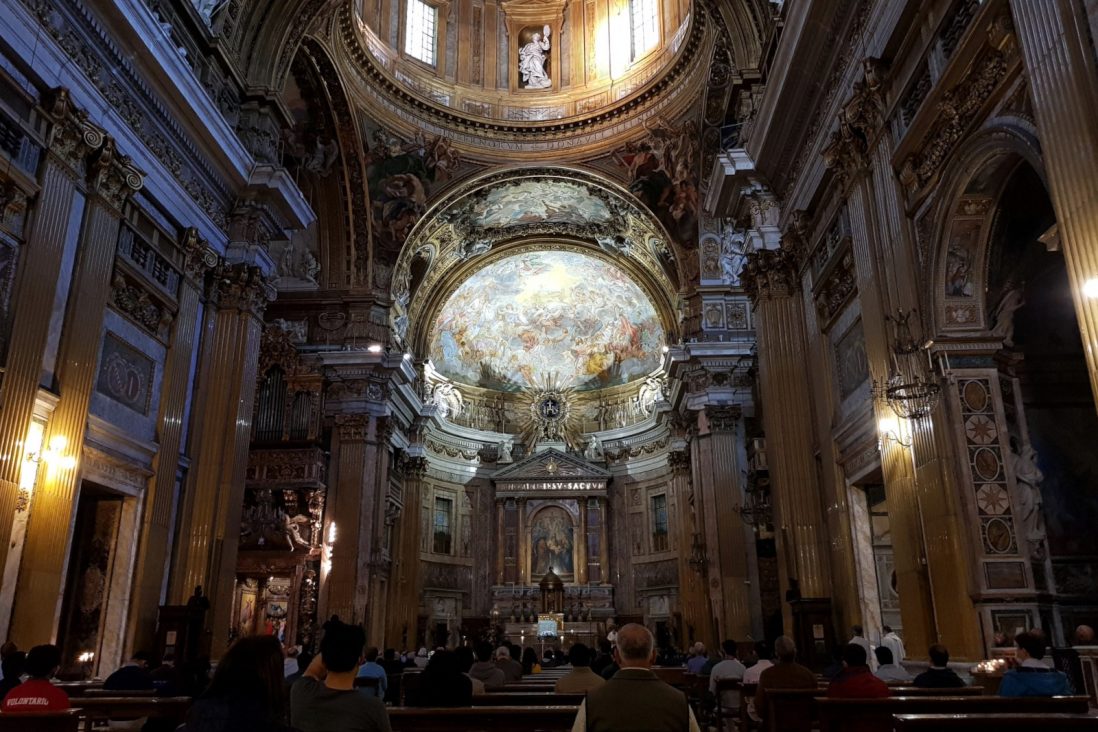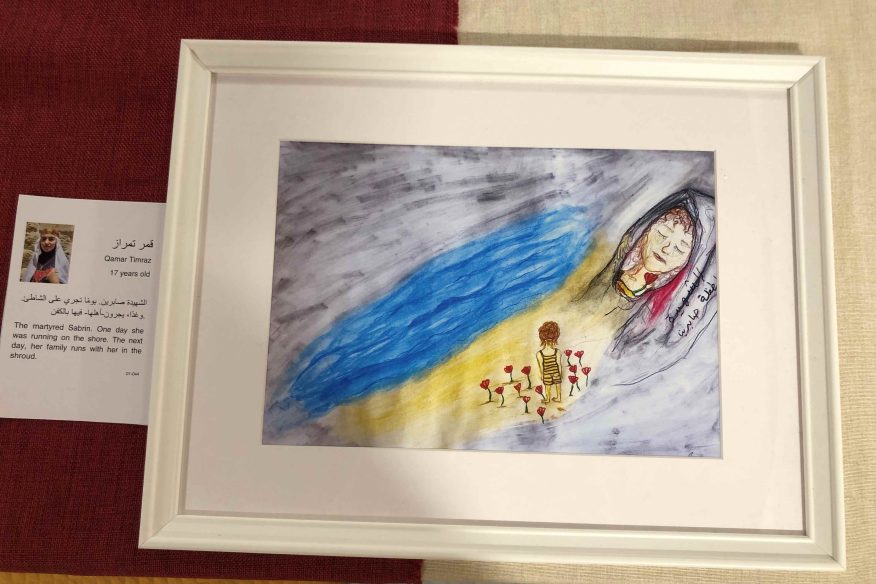The journey begins: a vigil at the Gesù Church in Rome

Three Scholastics prepared the prayer. The aim of the prayer was to highlight Ignatius and his holiness, an initiative of God. Discernment, a gift for all Ignatius’ choices will challenge us after the Covid pandemic.
The cannon wound, the sword, the shrine containing the relics and the glory of the Saints. These are the symbols on which the program of prayer proposed on May 20 at the Church of the Gesù for the initiation of the Ignatian Year was focused. The vigil was presided by Fr. Angelo Schettini, with short quotes from the autobiography, readings chosen by the Scholastics and hymns that relate to the Scripture texts.
“This prayer session has been appreciated by many for its solemnity and precision” Fr. Marco Colò, EUM coordinator for the events of this year, highlights. The alternating readings, the silence and the hymns were a means of producing a quiet meditation on some phrases and images from the autobiography and Scripture.”.
Three Scholastics prepared the prayer: Anselmo Rabadan Linares, who is studying philosophy at San Saba, Pietro Coppa, a Regent at the Massimo Institute and Dominik Dubiel, who is at the international theologate of the Gesù. They were given some help by Fr Massimo Marelli, rector of the Gesù Church.
A communal experience
“Working together is a highly consoling experience,” the Scholastic Pietro Coppa explains. “I neither knew Anselmo nor Dominik, yet from the beginning we worked in perfect harmony. Intimacy with the Word of God and knowledge of Ignatian spirituality are traits that all Jesuits have in common; it is as if everyone of us shared the same “spiritual genes” with each other. Each one shared his particular talent with the group, a skill which the others did not have.” Each one shared his particular talent with the group, a skill which the others did not have.” I selected the texts, Anselmo took care of the liturgy and Dominik thought of the songs. As we collaborated, I was reminded of Paul’s discussion in the First Letter to the Corinthians about the Church as the Body of Christ (1 Cor. 12:4-24). For us religious, working together on a common apostolic initiative is a precious opportunity, because it reminds us that the talent of each one is not a reason for boasting, but a grace we have received, to be put at the service of others (1 Pt 4:10). Finally, we relished the opportunity to be able to arrange everything carefully so that the celebration could be a true moment of prayer, both for our confreres and for the lay faithful.
The holiness of Ignatius, initiative of God
The aim of the prayer was to highlight Ignatius and his holiness. “We chose to focus on the first part of the Autobiography. That is why we decided to emphasize the wound of Pamplona and the events immediately following it. We wanted to highlight that holiness is only possible if it is God who takes the initiative. It was not by chance that we combined the passage from the autobiography with the biblical image of the potter (Jer 18:1-10). We wanted it to be clear that it is God who takes the first step. We “only” have to let ourselves be shaped. This image of God is fantastic, that through the cannon wound and a long convalescence God abolishes the old Ignatius and moulds a new one.”
Discernment, a gift to be shared
The Ignatian Year is an invitation to deepen and spread more profusely Ignatius’s teaching on the discernment of spirits. “Not only to offer to many the possibility of doing the Spiritual Exercises, but also and above all to promote discernment as a permanent attitude for those who choose to follow Jesus. It is not the prerogative of the Jesuits, but a practice which every Christian should undertake. Ignatius’ rules for discernment are the fruit of his exceptional charism in this area, but discernment of spirits is already explicitly spoken of in the New Testament (cf. 1 Cor 12:10 and 1 Jn 4:1). These passages are evidence that Ignatius’ charism is rooted in the tradition ofthe Church and is a gift to the Church. I am convinced that the legacy of our founder is a treasure that everyone, in one way or another, should become a part of.”
Making memory of what we have received through Ignatian spirituality
For those close to the Jesuits, this Ignatian Year is an opportunity to remember what they have received from the Society. Many are grateful because they have been able to experience greater freedom and a profound renewal of their own life of faith,” Peter highlights. “Not infrequently those who come into contact with our spirituality realize that “the letter kills, but the Spirit gives life” (2 Cor. 3:6). They are amazed when they discover that in prayer it is “the same Creator and Lord” who communicates with the soul (SpEx n.15). Many feel at home when we exhort them to “seek and find God in all things”: it is an invitation that enhances the creativity and talents of the individual person. Each person’s search for God is conditioned by his or her own personal history and way of being. People like these elements to be valued as starting points for the journey towards God and their brothers and sisters”.
Ignatius’ choices will challenge us after the Covid pandemic
During his convalescence, Ignatius found himself facing a crossroads: either to return to the life of a soldier or to dedicate himself entirely to the service of the Lord. “The world, after the Covid-19 wound, is at a crossroads. The strongest temptation is to “fall back into our former selfishness”. The health crisis should stimulate us to transform our personal life and that of the society where we live.” The health crisis, while representing a tragedy, must push us to a similar reflection, so as to transform our personal lives and that of the society in which we live. Another episode in the life of Ignatius that has much to say to the world today is that of the “vigil in arms” at Montserrat: after praying for an entire night before the altar of Our Lady, the saint decided to abandon his soldier’s clothes and put on the arms of Christ. The world torn apart by wars must abandon the mentality that overpowering others is the only way to interpret life. The recent escalation of the conflict between Israelis and Palestinians is only one of the many conflicts that rage in the world and that do not show signs of being resolved. Ignatius’ choice, for the world and its rulers, is an invitation to cease hostilities; for us religious, it is an exhortation to have “our feet shod and ready to propagate the gospel of peace” (Eph. 6:15).

